
by Rita Fierro | Oct 18, 2019 | Antiracism, Racism, Uncategorized
African American people taught me how to live well, at peace, while feeling like a fish out of water. It hurts to watch how many people, and our media, assume that violence is norm in Black culture.
By the standards of most Americans I am an incredibly weird person. I am an Italian American woman who spent seven years studying African American culture in college, first for a Master’s in Sociology, then a PhD in African American studies. I left a life in Rome, Italy, the eternal city, to study in Philadelphia. I wish I could make a collage with the look on people’s faces, of all colors, when I tell them what I just told you.
I studied to end injustice, but I also studied to make peace with my own dual Italian American cultural heritage. I felt at odds in my own skin.
In those seven years, I did a lot more than study. I grew up, too. The journey started at 23. I got my PhD at 30. And in those seven years, I met two women, who led me, taught me, assisted me, held me, and walked with me in the path to becoming a woman. Both of these women are Black. So I joke at times that I’m an Italian American raised by Black women. Without these women, I could not be who I am. They taught me to love myself unconditionally, forgive myself, express myself, express my art, stand and walk in the world, while never fitting in.
It’s been ten years since the PhD and I’ve continued to grow. I’ve continued to listen and learn about Black folks in America. And I feel that I understand now that while my mentors are phenomenal individuals, their lessons were cultural, from a collective experience. They taught me some of what their families had taught them: how to survive in the face of incredible adversity.
I’ve reached the conclusion that Black people are the ethical anchor of our country. Because of ongoing discrimination, in housing, education, voting, employment, health, and the criminal justice system, Black folks have needed to dig deeper into their humanity, their resources, their talents, their networks, than anyone else in order to survive America. Of course, many other people of color have experienced these challenges, too. Over the years, I felt an affinity for African American culture that made me want to know more.
To me, the reason why Black folks dominate the art world is because they’ve needed to use art to express their deepest pain, injustice, and emotions. From old spirituals to blues, Nina Simone to Miles Davis, India Arie to The Roots, art has become a vehicle for humanity, for expressing humanness, aliveness. Playing hearts, souls, and pain through the beat of drums, voices, guitars, trumpets, saxes, and basses.
I’ve traveled the world. Yet in my experiences, Black folk in America, as a people, have deeper compassions, feelings, and forgiveness than any other culture I know. They have been trying to forgive white folk for hundreds of years of injustice. They’ve been nurturing community and organizing peacefully as long as they’ve been on this land.
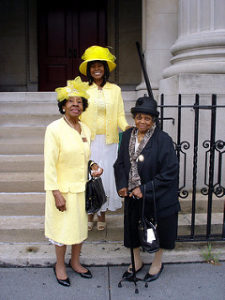
Dressed in Sunday’s Best
I know most white folks are scared that Black folk will become violent and attempt to turn over the social order and be on top. This has not happened and will not happen because Black folk will not do to whites what we did to them because the majority of Black folk have worked hard and work hard every day to be productive, patient, and loving. To believe that a better world is possible. To not judge the few for the actions of the many.
Spirituality upholds Black folk. The strong connection to each other, to God, to a higher power, to prayer, to whatever you want to call it, that connection has kept Black folk alive and positive for centuries. Have you noticed how in Black neighborhoods there is a church every few feet? Learning to elevate one’s heart, mind, and soul above limiting circumstances. Moving mountains with kindness. Drawing strength, never easily, from the bowels of existence, which in the words of W.E.B. DuBois “dogged strength alone keeps from being torn asunder.”
Most of us white folk are so attached to having things our way that we lack the same capacity to be positive through hardship, love through challenges, patient when times or tough, and to express when we’re in pain. Think how much you would love your neighbor if you knew that their great-grandfather had raped your great-grandmother, during slavery, and that your neighbor’s family has forgotten this, but yours has not.
How much would you love your neighbor if your neighbor’s brother also worked for the police force that killed your dad when you were 5? And your brother when he was 15, and your best friend when he was 20?
Now add on the fact that your neighbor also has better access to better healthcare, education, employment, housing, legal and political representation than you. Would you even try to love your neighbor? Would your protests against inferior access to healthcare, education, employment, and legal representation be peaceful?
It is this ability to connect with humanity, with humanness that causes white folks to be so enamored with Black music, culture, food, fashion. We white folks reach out to Blackness to connect with our own humanity.
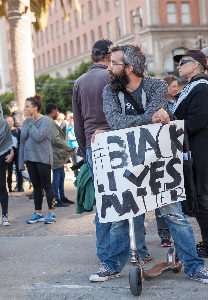
A rally attendee on a scooter holds a sign reading Black Lives Matter at Justin Herman Plaza, San Francisco.
This is also why I believe when we white folk say something we know is questionable in a group conversation, we look at Black folk for a reaction. Deep down, we know Black folk are the measure of our humanity. We know they are the measure of whether what we said was fucked up.
Most Black folks are already modeling humanness with incredible compassion and grace. But we cannot demand they do what we as a country, don’t do.
Our country is a ship in the waters of ethical confusion. Black folk are the anchor. They anchor us with the deepest and most profound parts of our country’s humanity: our ability to love, to create, to forgive, to connect, to organize for justice.
The waters are getting choppy. And the captain–society, the government, white folks, our institutions–is revving the motor. How can we expect the anchor to keep the ship grounded?
Every murder is an acceleration. Every child charged as an adult is an acceleration. Every bargain deal accepted by an innocent man is an acceleration. Every person in prison because they cannot pay a fine is an acceleration. The ship cannot stay still if the acceleration continues.
It is unjust to expect Black folk to anchor our collective ship.
The chain linking the anchor to the ship is breaking.
So whomever you are, wake up. Find your humanity. Choose whether you want to keep revving the motor on our ship or demand it stop. Get involved to change the conditions that are generating this insane acceleration. Join an organization, that suits you, that is working to slow it down. There are many.
Langston Hughes described it well when he wrote:
“What happens to a dream deferred?
Does it dry up
Like a raisin in the sun?…
Or does it Explode?”
Langston Hughes
***
I wrote this in response to the killings of Philando Castile in Minnesota and Alton Sterling by the hands of police officers. May your souls rest in peace. May your lives not be ended in vain.
Five hours after I wrote this, Micah Xavier Johnson, a Black man who had served in the United States Army in Afghanistan, earning several medals, shot 11 white police officers, killing five, in Dallas, TX.
Images:
Dressed in Sunday’s Best by Su-Chan
https://www.flickr.com/photos/su-chan/
A rally attendee on a scooter holds a sign reading Black Lives Matter at Justin Herman Plaza, San Francisco.
By Pax Ahimsa Gethen – Own work, CC BY-SA 4.0, https://commons.wikimedia.org/w/index.php?curid=50063410
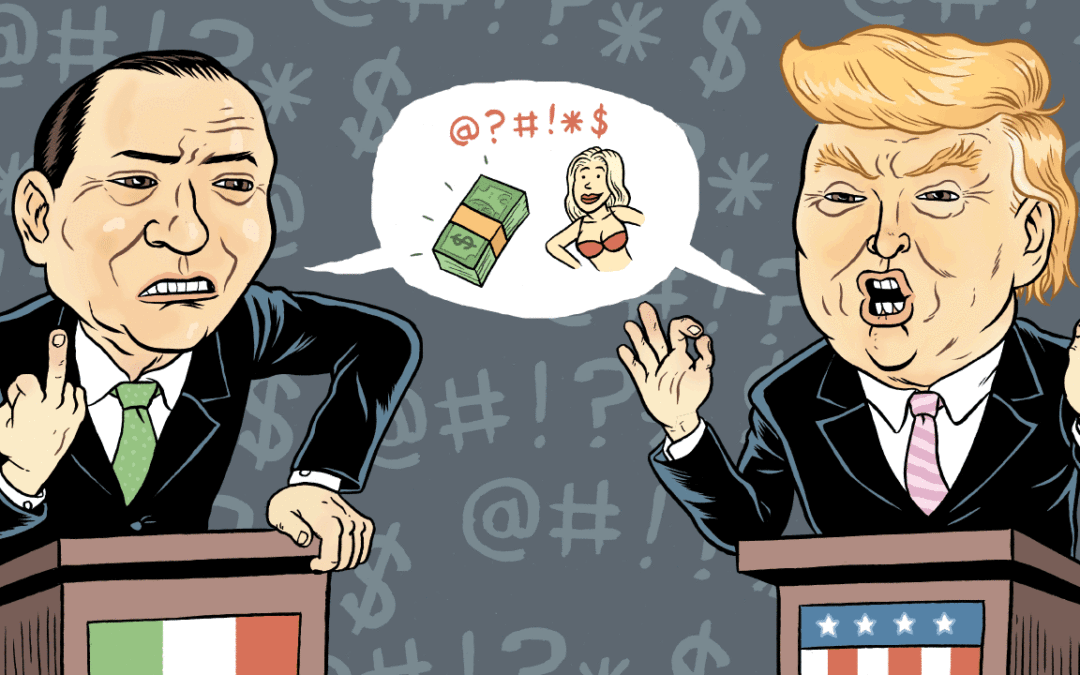
by Rita Fierro | Oct 18, 2019 | Inclusive Conversations
Got relatives or friends on the other side of your political beliefs? Can’t get three words in before the conversation gets rough? Do you avoid talking all together to avoid feeling awful? For my series on inclusive conversations−conversations where differences are seen not as a resource, not a threat−and this tip is for you: don’t word-pick, empathize.
Here’s how this tip became real to me.
Italy. Summer of 2008. It was the first summer Obama was in office. I was in a pub in Rome having a drink with two good friends and some of their friends I barely knew. It was Obama’s first year, and Europe was thrilled and relieved that we just abandoned the Dark Age, religious crusade era of George W. Bush. Hope was in the air, for a man who could compose a grammatically correct sentence, inspire the audience, was savvy in international politics, and had used hope, rather than fear, to galvanize his voters.
One of my friends introduced me to the others as an expert in African American culture, given my PhD in African American Studies.
Someone asked, “So what do you think about Obama being elected? Has the United States stopped being racist?”
“Well,” a second person replied, “you can’t ask that question, because Obama isn’t really Black.”
In the context of the United States, that was of course an offensive statement.
People had accused him of not being Black enough during the primaries, but this was Italy, a different context all together. They knew little or nothing of that aspect of the American controversy.
Italy has not had a movement for political correctness and people are extremely blunt.
I was tempted to word-pick. I have been trained to. I was taught to word-pick debating in college: “How are you defining ___?” And the conversation shifts to definitions, away from the original topic. It’s a good stalling tactic, but it’s not a good bridge builder, like most debate tactics. Debating is about winning, not about building understanding. And the word-pick debate is often useless, words are used differently in different cultures, contexts, by different people, even.
I tried to not beat him down with knowledge (see Tip #4 Meet people where they are). Instead:
1) “Don’t get furious, get curious” it’s a tip from the Virtues ProjectTM. When someone says something that comes across as offensive, try asking questions.
“Why would you say that?” I said.
“Because his mother was white.”
“Actually in the United States, for centuries, a one-drop rule defined Black any person with any African ancestry. So most people with any African ancestry in America consider themselves Black, because they are treated as such. Plus, Blackness in America is cultural, not just genetic.
“Oh. I thought that because he’s light skinned, there would be no prejudice against him. You know like Berlusconi saying, “he’s just a little tanned….”
2) Ask more questions. Try to understand why they think that way.
“What makes you think there’s no prejudice?”
“He’s a lawyer, he looks cool, he’s not that dark, like here, you know Black people here are really Black (Italy has a large Senegalese immigrant population)……when we see someone like him, we don’t think of them as Black.
“Do you see why what you just said is offensive?”
“No, I don’t. I think the Italian leftist media is exaggerating.”
The attack on the media. The ongoing defense of the populist millionaire mogul who had “such a high opinion of himself that he thinks it’s acceptable to say anything to anyone.” Sound familiar?
Don’t get confused, I’m talking about Italy, 2008. Americans made fun of us back then for the galvanizing appeal the billionaire media mogul’s simplified messages had. Because he was rich, “Many Italians were convinced that he would do for their country what he did for himself.” But he didn’t.
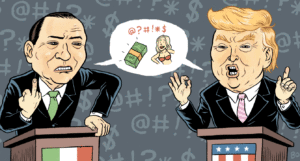
He left the country in shambles, looking only after himself. He governed for 9 years and was a prominent political leader for 19 years, 1994-to 2013. What finally got him out of politics (but only for 6 years, let’s see what happens in 2019) was a tax evasion lawsuit. The many others (2,500 trial dates across 17 years as prime minister), distortion, corruption, prostitution of minors, could not. He had passed a law while in power that people in congress could not be persecuted and another law that people over seventy could not be locked up. So he’s “paying” now with community service, while Italy stumbles to recover from 20 years of populism and a destroyed economy.
We have a lot to learn from Italy.
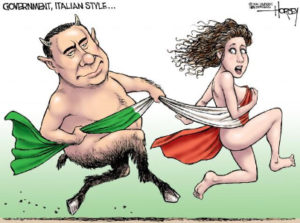
Back to the man in the pub.
“Where do you read your news from?” I asked
He mentioned a right-wing Italian local newspaper.
I struggle to empathize – to see where he is coming from. He does not know the USA context, he does read USA newspapers, he doesn’t know any Black American people.
I taught him a few things about American history, the one-drop rule, ongoing discrimination, Black culture. By the end, I was offering him websites to read.
“You’re in the context, you know so many things, I don’t.” He concluded. “I’d be curious to read different kind of news about America. Over here we always get the same crap…”
This conversation ended well. They don’t always. I’ll have to tell you about one gone bad sometime….
And while giving up on word-picking may not change your opponent’s position, deep listening, just may. A new study says just that…there is hope after all!
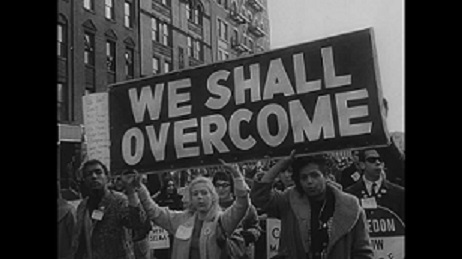
by Rita Fierro | Oct 18, 2019 | Antiracism, Racism, Trauma Transformation, Uncategorized
We have work to do. The election of Trump has ripped the bandaid off our modern myths of justice, revealing the collective wounds we swept there after the Civil Rights Movement. While our society shifted to a more inclusive society in the 1960s, fifty years of good intentions does not erase 350 years of horrific deeds.
Our wounds have been festering for centuries, cyclically reopened by violence. We are now being called to face our demons and to heal more fully, together.
Persecuted white Europeans migrated here only to enslave others and transfer their victimhoods onto indigenous peoples and Black people. As Black people have rebelled at injustice, at each advancement white people have been reminded of their own ancestral wounds the pain of which increases with privilege lost. Every person and every culture can transform this pain, can create a new pattern, but we haven’t yet.
In the Civil Rights Movement, we tried to create new patterns using nonviolent tactics aimed to replace fear with love. Northern white liberals used these methods only to transform the hateful hearts of Southern racists without redirecting our energies back onto ourselves, our communities, and local economies.
In the north, we barred Blacks from unions, allowed housing segregation and job discrimination to continue, and decided having Black people sit at lunch counters was change enough, turning a blind eye to the truth that many didn’t have money to enter the restaurant at all. We betrayed justice and fed ourselves tales of victory, focusing on the new handful of Black faces populating our neighborhoods, restaurants, and workplaces. We did nothing to support the majority of Black folks whose poverty, injustice, and incarceration rates were rising. The non-violent movement in the south became the violent rioting movements of the north because when racial justice was needed economically, whites chose to turn back to our privilege and live complacently.
As whites, we must feel our wounds again now. We must look into the mirror. White folk of all shades, now is our opportunity to atone, heal ourselves and our ancestral pain.
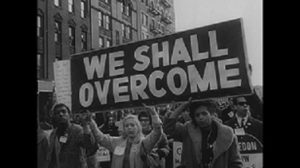
Civil Rights Protest, 1965
For us people of color, the original wound stems from slavery. The original wound was a loss of self, physically, emotionally, and spiritually. An overlooked piece of our journey to freedom is that slavery was only 1/3 physical. Most of us have not made it to freedom. Our bodies may have made it to the north, but our minds and spirits have yet to reach their destination.
The trauma of slavery has affected our ability to respond. We often take the blame for things that aren’t ours and blame others for things that aren’t theirs. Taking responsibility means, quite literally, the ability to respond. We need to intentionally remember: our history, our strength, our journey, ourselves and our spirit because there has been an intentional dismemberment of those things in our communities. The plan was to keep the body strong and the mind and spirit weak.
The Civil Rights Movement brought lots of gifts including a wound of unkept promises. As African Americans in this country we don’t get to live our lives as individuals. We are seen as the collective “we” everywhere we go. This “we” is simultaneously bonding and supportive and binding and restraining. The illusion of the Civil Rights Movement was that we would finally live as individuals.
When Martin Luther King died, many of us abandoned love, choosing fear and anger instead. The pain of losing Martin was too much for us to bear. When they killed him, some of us started to believe that love didn’t always win and we wanted to win. So we put back on the cloak of fear and anger and started to fight again.
Each side has its share of the collective wound, two sides of the same coin. But now, as a nation, we face a choice.

Black Lives Matter protest, San Francisco
If we repeat the cycle of violence, our weapons are stronger than they were 60 years ago. It’d be easy to self-destruct this time. If we choose to heal, we can become united like never before. Here are the ways we can heal, build a foundation for a new movement, and reach unity:
(1) Clean the Wound, Face the Truth
Let us remove the niceties, the fake stories of glory, the arrogance of superiority. Let us face the truth of our country’s history: We are not an exemplary democracy. We have nothing to preach about. We are hurting and we are still trying to understand how to create justice. It is time to feel the rage and anger that is trapped inside.
(2) Disinfect the Wound, Mourn
We need to grieve together. Grieve with people you trust so we can let go of the past and create room for a new future. Our new movement begins with the courage to mourn communally.
(3) Suture the Wound, Drop the Fear and Reach for Deeper Healing
We must move away from reacting. Step into responsibility instead of reaction, choose purposeful action and if we don’t know that is yet, wait until we do. In giving up fear, we can deepen our understandings and make choices from a place of truth, inspiration, and love. We must give up rushing to action for action’s sake. Go inward first. Healing at the individual level is needed to heal at the system level. Let us aim for deeper healing.
(4) Tend to the Scar, Don’t forget, Instead Act from Deeper Wisdom
We must learn and remember our history. Every right earned had a backlash: slave-breeding followed the end of the slave trade, the Dred Scott case followed the underground railroad, lynching followed Black economic advancement, the assassination of leaders followed the Civil Right’s movement. This is the beginning of the backlash of Obama’s election. We too must do what generations preceding ours have done. We must organize, push, hold accountable, and stay united in the face of fear and national terrorism.
(5) After the Healing of Individual Wounds, Tend to Collective Scars
After bringing our attentions to our own wounds, we can tend to the scars of how we have related to each other. Let’s leave Facebook activism and choose diverse groups of people we can unite with face to face. Build your skills and engage in hard conversations. Learn to lean on other brothers and sisters.
(6) When All Scars are Healed, Build a New Movement
Once the wounds are healed we can build true unity. We may still hurt each other from time to time, but we will know how to transform this pain instead of transferring it. We will be stronger than ever, and we will put together the lessons of the past to build a new movement.
The dialogue of our election campaign revealed an adolescent nation at best. We are being asked to grow up. It’s a moment of initiation. And as is true with most initiations, there is a real chance we won’t make it. Complacency could cost us 150 years of social progress. However, with a foundation of healed wounds, we can respond instead of reacting. Once we can do that, we will be undefeatable. There is a path forward. Blessings to us all on this journey.

by Rita Fierro | Oct 18, 2019 | Facilitation, Participatory Leadership, Trauma Transformation, Uncategorized
When most people think about trauma, they think about how individuals experience physically or emotionally violent circumstances that leave them traumatized. Traumatic experiences are painful, but can be transformative, too. Personal healing is transformative when we release shame, blame, and guilt, and allow the traumatic experience to be integrated into the rest of our lives. The same goes for groups. When trauma occurs in groups, both the individual and the group can learn from it. Welcome to my new blog series: Trauma is a two-way street.
When a person experiences trauma it affects how they interact in all the groups they belong to. Conflict, dishonesty, and challenges among groups, I argue, are most often rooted in trauma, both individual and collective. In group dynamics too, trauma is not just an obstacle, it is an opportunity for transformation. The group can strengthen its bond and its commitment to its shared work when trauma is understood, transformed, and integrated into the group’s experience of itself.
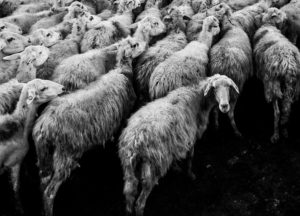
Take scapegoating, for instance. People who have been emotionally, physically, or sexually abused as children, often develop a sense of isolation in their families. They feel that they’ve never been protected and safe. As a result, they learn to fend for themselves, and are often looking out for the next attacker or betrayer, developing a distrust in people, and especially groups. They can also become very independent and self-reliant, ready to speak their minds and be successful despite the lack of support. In group, this combination of factors often translates into being a truthteller without building supportive relationships. Groups often react negatively to people who do this, especially when that truth is being avoided.
So the group blames the individual for disrupting the group’s flow and the individual is scapegoated. If individual leaves, the group is likely to do the same to the next person. When the person leaves, they experience the same thing in the next group they join. When both sides avoid truths about themselves, the dynamic is repeated in a painful, disempowering way.
But scapegoating can become an opportunity to transform trauma, instead. Let’s see how.
I wrote Avoid Being Scapegoated: Look for Allies and Build Support a couple of years ago. In this blog, I’m focusing on how scapegoating affects groups and what both the individual being scapegoated and the group can do about the experience to transform the trauma.
What the person being scapegoated can do:
– Take ownership of your need to heal your own emotional wounds. Discover your first experiences being scapegoated (generally in the family), and do whatever you need (journal, release the emotions, create art, etc.) to heal them. If the emotions are very intense, you may want to support seek out support from a professional: energy-worker, acupuncturist, massage therapist, or a psycho-therapist. You may consider taking a break from the group while you do this.
- – Say that you feel scapegoated: “I feel I’m being scapegoated for speaking my truth.”
- – Shift the attention away from yourself: “Can the group honestly say I am the only person that feels this way? I am the only one that sees what is happening as problematic? I hear you say that your concern is that ____. I’m curious to know if others agree with you or there are other perspectives as well.””
- – Build Allies and support. Before attending other meetings, ask people you trust about their thoughts and request their support: “Since you also think/feel about about this the way I do, the next time people gang up on me, could you please speak up?”
- – Restate your commitment to the group, and move the conversation forward: “My commitment is to contribute to this group fulfilling its intention to_____. Can you see that my comment comes within this commitment? Can you hear it so we can learn and move beyond it instead of getting stuck in it? Can we take a step back, and think about what’s next?”
What the group/group facilitator can do:
- – Identify the issue creating the scapegoating and ask the group to own how they contribute to it: “What does everyone else think/feel about this issue?”
- – Make space to learn from the conversation: “I’m grateful this was brought to our attention. What does this discussion teach us about ourselves and our work?.”
- – Support Transparency, create a space for people to share opinions privately (not everyone will speak out publicly): “ I’m happy this was brought to my attention. It’s always better to share reservations so we can handle them, instead of hiding them. Feel free to communicate privately with our leadership, too.”
- – Integrate dissent into the meeting. Choose a check-in question that allows everyone to speak to how they participate in the dissent: “Complete the sentence. What frustrates me most about this process right now is….”
- – Envision how the group can grow from the experience: “I’d like to see us grow from this conversation, what if we all became more ___ /built our capacity to ____ as a result of this conversation?”
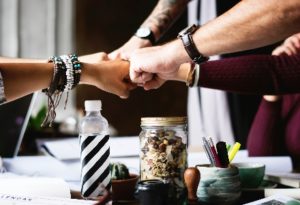












Recent Comments